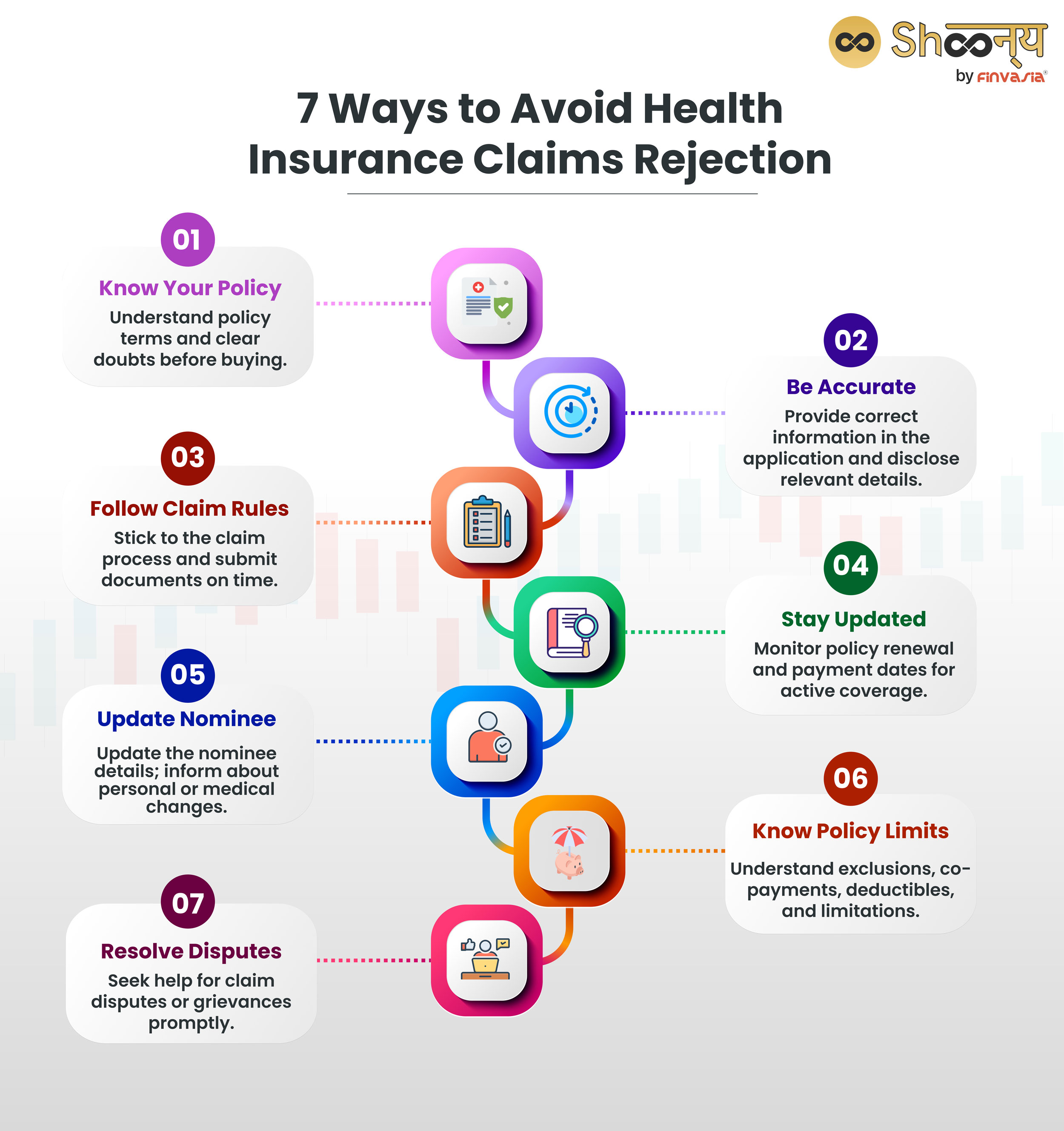7 Ways to Avoid Health Insurance Claim Rejection

Insurance claim rejection is a situation where an insurance company refuses to pay for the services or products that it has agreed to cover. This can happen for various reasons, such as errors in the claim, policy exclusions, non-disclosure of information, or policy lapse. Insurance claim rejection can cause financial stress and frustration for the policyholders, who may have to bear the expenses out of their pocket or seek other sources of funding in cases of emergencies.
Today, we will share some common health claim rejection reasons and how you can avoid health insurance claim rejection by your company.
Rejection in Medical Billing by Insurance Company
Rejection in medical billing is a specific type of insurance claim rejection that occurs when a claim does not meet the data requirements or the basic format of the insurance company. These claims are not processed or entered into the system of the payer, and they are returned to the provider with the details of the error.
Rejected claims can be corrected and resubmitted by the provider, as they are not considered as received by the payer.
Most Common Health Insurance Claim Rejection Reasons
Claim rejection reasons can vary depending on the type of insurance and the policy terms and conditions.
However, some of the common reasons for claim rejections are:
Incomplete Information on Claim Form
Missing, incorrect, or incomplete information on the claim form, such as the policy number, the date of service, the diagnosis code, the procedure code, the provider name, etc.
Non-disclosure of Relevant Information
Non-disclosure of pre-existing conditions, let’s say about your existing health issues, previous claims, or other insurance policies that may affect the coverage or the premium of the policy.
Waiting Periods for Uncovered Treatments
Waiting period for certain treatments or conditions that are not covered by the policy until a specified time has elapsed.
Delayed Submission of Documents
Delay in submission of documents or claim forms, as there may be a deadline by which the claim should be filed to the insurance company.
Discrepancies in Supporting Documents
• Discrepancy in documents, such as medical reports, bills, prescriptions, or receipts, that do not match the claim form or the policy details.
Policy Lapse
Policy lapse due to non-payment of premiums or expiry of the policy term, which results in the termination of the coverage and the benefits.
Failure to Update Nominee Details
Non-updation of the nominee details, which may cause confusion or dispute in the claim settlement process.
Insurance Policy Limitations
Policy exclusions or limitations, such as co-payment, deductible, sub-limit, or permanent exclusion, may reduce the overall claim amount or, in some cases, even deny the claim amount.
Seven Ways to Avoid Health Insurance Claims Rejection

Here are some basic things to keep in mind that can help you avoid health insurance claims rejection in India:
1. Read and understand the policy document carefully, and clarify any doubts or queries with the insurance company or the agent before buying the policy.
2. Provide accurate and complete information on the policy application and the claim form, and disclose any relevant information that may affect the coverage or the premium of the policy.
3. Follow the claim process and the guidelines of the insurance company, and submit the claim form and the documents within the stipulated time frame.
4. Keep track of the policy renewal and the premium payment dates, and ensure that the policy is active and valid at the time of the claim.
5. Update the nominee details and inform the insurance company of any changes in the personal or medical information of the policyholder or the insured members.
6. Check the policy exclusions and limitations, and be aware of the co-payment, deductible, sub-limit, or permanent exclusion clauses that may apply to the claim.
7. Seek assistance from the insurance company, the agent, or the ombudsman in case of any dispute or grievance regarding the claim.
Steps to Follow in Times of Health Insurance Claims Rejection
If your health insurance claim is denied, you have options to contest the decision. Here’s a simplified guide:
- Understand the Rejection:
- Find out why your claim was rejected.
- Contact your insurance company for a written explanation.
- Check your policy documents and claim form for errors.
- File an Appeal:
- If you believe the rejection is unfair, file an appeal.
- Write a letter or email to your insurance company’s Grievance Redressal Officer (GRO).
- Explain why you disagree with the rejection and provide supporting documents.
- Escalate to IRDAI:
- If you are not satisfied with the GRO’s response or if there is no response within 15 days, you could take the matter to IRDAI (Insurance Regulatory and Development Authority of India).
- File a complaint online through the Integrated Grievance Management System (IGMS).
- Approach Insurance Ombudsman or Consumer Court:
- If unhappy with IRDAI’s resolution, consider the insurance ombudsman or consumer court.
- File a complaint with the insurance ombudsman within one year of claim rejection.
- Consumer court is another option based on the amount of your claim; file at the district, state, or national level.
Remember, it’s essential to gather evidence, clearly communicate your disagreement, and follow the proper channels to appeal the issue.
Conclusion
Health insurance is a valuable investment that can protect one from unforeseen medical expenses and emergencies, and by avoiding health insurance claim rejection, one can make the most of it. However, health insurance claim rejection can be a stressful and frustrating experience for policyholders, who may have to face financial difficulties or compromise on the quality of care. You can avoid such circumstances by following some simple steps and precautions, as shared, for a hassle-free claim process.
______________________________________________________________________________________
Disclaimer: Investments in the securities market are subject to market risks; read all the related documents carefully before investing.








